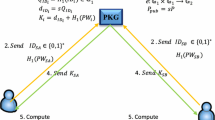Abstract
Deniable authentication is an important security requirement for ad hoc networks. However, all known identity-based deniable authentication (IBDA) protocols are lack of formal security proof which is very important for cryptographic protocol design. In this paper, we propose a non-interactive IBDA protocol using bilinear pairings. Our protocol admits formal security proof in the random oracle model under the bilinear Diffie-Hellman assumption. Our protocol is faster than all known IBDA protocols of its type. In addition, our protocol supports batch verification that can speed up the verification of authenticators. This characteristic makes our protocol useful in ad hoc networks.

Similar content being viewed by others
References
Tian X, Fang Y, Ideguchi T (2006) MATS: multichannel time-spread scheduling in mobile ad hoc networks. IEEE Trans Wireless Commun 5(3):612–621
Li CT, Hwang MS, Liu CY (2008) An electronic voting protocol with deniable authentication for mobile ad hoc networks. Computer Commun 31(10):2534–2540
Boneh D, Franklin M (2003) Identity-based encryption from the weil pairing. SIAM J Computing 32(3):586–615
Zhao S, Aggarwal A, Frost R, Bai X (2012) A survey of applications of identity-based cryptography in mobile ad-hoc networks. IEEE Commun Surveys Tutorials 14(2):380–400
Shi Y, Li J (2005) Identity-based deniable authentication protocol. Electron Lett 41(5):241–242
Cao T, Lin D, Xue R (2005) An efficient ID-based deniable authentication protocol from pairings. Proc AINA 2005:388–391
Chou JS, Chen Y, Huang JC (2006) A ID-based deniable authentication protocol on pairings. Cryptology ePrint Archive. Report 2006/335
Lim MH, Lee S, Park Y, Lee H (2007) An enhanced ID-based deniable authentication protocol on pairings. Proc ICCSA LNCS 4706:1008–1017
Lim MH, Lee S, Lee H (2008) Cryptanalysis on improved Chou et al’.s ID-based deniable authentication protocol. Proc ICISS 2008:87–93
Cha JC, Cheon JH (2003) An identity-based signature from gap Diffie-Hellman groups. Proc. PKC 2003 LNCS 2567:18–30
Pointcheval D, Stern J (2000) Security arguments for digital signatures and blind signatures. J Cryptol 13(3):361–396
Scott M (2007) Efficient implementation of crytographic pairings. http://ecrypt-ss07.rhul.ac.uk/Slides/Thursday/mscott-samos07.pdf
Chan ACF (2012) Distributed private key generation for identity based cryptosystems in ad hoc networks. IEEE Wireless Commun Lett 1(1):46–48
Author information
Authors and Affiliations
Corresponding author
Additional information
This work is supported by the National Natural Science Foundation of China (Grant Nos. 60803133, 61073176, 61003230, 61003232, 61103207, 61272525 and 61272404).
Rights and permissions
About this article
Cite this article
Li, F., Xiong, P. & Jin, C. Identity-based deniable authentication for ad hoc networks. Computing 96, 843–853 (2014). https://doi.org/10.1007/s00607-013-0321-5
Received:
Accepted:
Published:
Issue Date:
DOI: https://doi.org/10.1007/s00607-013-0321-5
Keywords
- Ad hoc networks
- Deniable authentication
- Bilinear pairings
- Identity-based cryptography
- Random oracle model




